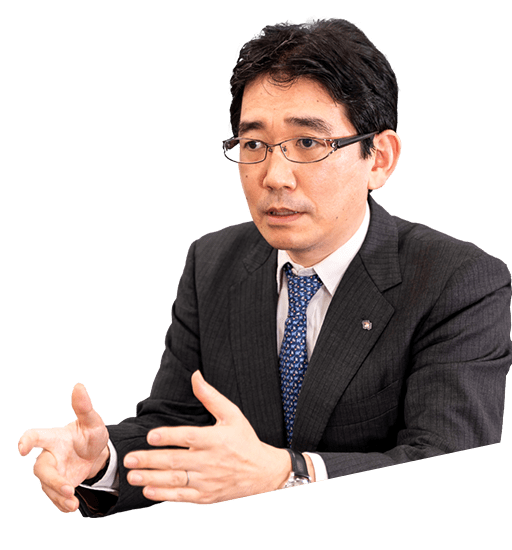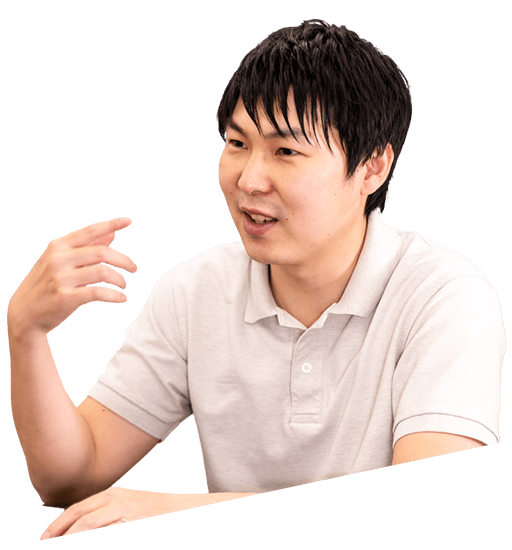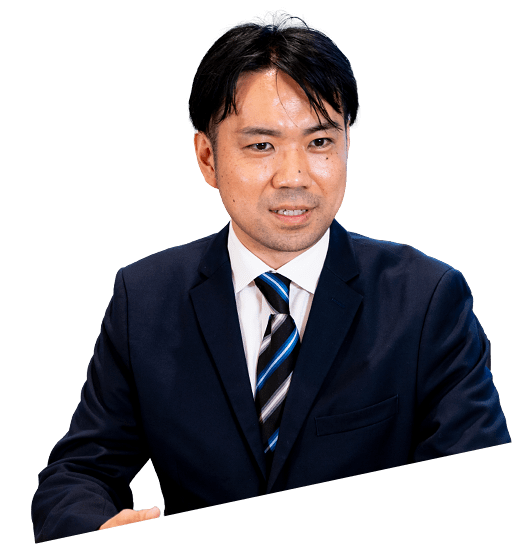Analyzing the present state of the economy being shaken
in the midst of a rapidly changing society
INTERVIEW / YOSHIYUKI SUIMON
YOSHIYUKI SUIMON
Joined the company in April 2007
Yoshiyuki joined Nomura Securities Co., Ltd. in 2007, where he works at its Financial & Economic Research Center. Yoshiyuki was engaged in market analysis of JGBs and interest rate derivatives, then studied in the US, and worked as an economist in charge of the Japanese economy before becoming the head of the Data Science Department in 2022. He obtained MBA from the University of Michigan’s business school in 2013. He received Incentive Award from the Japanese Society for Artificial Intelligence (JSAI) in 2017 and 2019. He also received the Best Paper Award from Special Interest Group on Financial Informatics, JSAI, in 2020. Yoshiyuki completed the Doctoral program at the Graduate School of Engineering, the University of Tokyo, and received his Ph.D. (engineering) in 2021. He is also presently a part-time lecturer at the University of Tokyo's Graduate School of Public Policy.
![]()
In financial and economic research, a wide variety of social data is subject to analysis.
― What kind of research did you do before joining Nomura Securities?
Before joining the company, I conducted research in a field called information theory at graduate school. In specific, my research topic was data compression. For example, I developed an algorithm for compressing arbitrary data files such as text, images, and audio, actually compressed them, and showed the compression limits from both simulation and theoretical perspectives. In the process of applying mathematical techniques to the field of computer science, I gradually became motivated to broaden the range of topics and events to be analyzed. This is the reason why I chose to do research at Nomura, where I can conduct analysis and research on financial economy that involve a wider range of social events (various social data).
― Why did you choose Nomura Securities to explore financial economy?
The research division of Nomura Securities (incl. the Financial & Economic Research Center) was established by transferring the former research division of Nomura Research Institute to Nomura Securities. As a result, they have a think-tank culture, where they conduct research and analysis from a long-term perspective. At the same time, as an organization within Nomura Securities, we are able to closely follow the financial markets, which fluctuate greatly from one day to another. This kind of research environment that combines both static and dynamic aspects is very rare, which is why I found it attractive as a place to explore financial and economic events that are changing dynamically every day.
― What kind of work have you been doing since joining Nomura Securities?
After joining the company, I began my career as a quantitative analyst in the Fixed Income Investment Strategy Group (currently the Market Strategy Research Department) of the Financial & Economic Research Center. Specifically, I specialized in market analysis of Japanese government bonds and interest rate derivatives, analyzing them using a financial engineering framework and recommending investment strategies to major institutional investors in Japan and abroad. Interest rate derivatives transactions, with notional amounts ranging from tens of billions of yen to hundreds of billions of yen per transaction, literally move the financial markets. Derivative contracts themselves can be an effective tool for hedging price fluctuation risks and for entities with high risk tolerance in pursuing returns. However, these derivative contracts between many global financial market participants immediately transmit any negative shocks, such as a sharp decline in the price of the underlying asset or, in some cases, the failure of a transacting party, to the rest of the world. The global financial crisis that followed Lehman’s collapse in 2008 was an example of such financial crises. Though the 2008 financial crisis was then said to be a once-in-a-century incident, it was actually followed by a series of unparalleled incidents in recent years, including the European debt crisis and the Great East Japan Earthquake. As it continued to be difficult to foresee future structural changes based solely on a mathematical approach that relies on pattern analysis of past market data, I felt that fundamental analysis that focuses on in-depth understanding of economic and financial changes, as well as changes in policy and industrial structure, would become increasingly important. Therefore, in 2013, at the start of Abenomics, when the Bank of Japan began its monetary policy known as "unprecedented monetary easing," I applied to join the Economic Research Department of the Financial & Economic Research Center, which conducts fundamental economic analysis, and began working as an economist in charge of the Japanese economy.
![]()
Quickly analyzing the rapidly changing economic environment
― What is the work of an economist and what does it entail?
Economists in the Economic Research Department are responsible for formulating Nomura's house opinions on the outlook for the financial and economic sectors, and for analyzing various economic-related themes. As an economist at Nomura, I conducted macroeconomic analysis of consumption and prices, imports and exports, corporate behavior, monetary, fiscal, and economic policies in the Abenomics environment since 2013. That was a stimulating experience. Also, I have been developing economic analysis methods that utilize various data, leveraging my background in computer science. By making full use of satellite imagery, credit card payment information, cell phone location data, point-of-sales sales information, and various text and video information on the Internet, we can capture the economic changes occurring in the world today in almost real time. In particular, in an environment where the economy and society are changing drastically since the spread of COVID-19, it is a very challenging job to immediately analyze such information and disseminate analytical reports quickly.
A place where you can experience the dynamism of the financial economy firsthand
― What are some of the things you keep in mind when conducting research on financial economy?
Gathering a variety of information is the key to conducting high value-added financial and economic analysis. In doing so, in addition to the analysis of various data I mentioned earlier, it is essential to have daily discussions with the economists and strategists I work with and to collaborate with many corporate analysts who are familiar with industrial fields. Since Nomura Securities has excellent specialists in each field, I believe it is a very good environment to carry out analysis working with them. At the same time, it is essential to keep up with the latest analysis technology. Fortunately, Nomura has recently made progress in reforming the way we work, and I now have more free time to use. Therefore, I have been conducting various researches implementing advanced technologies outside of work as well as for self-improvement. I have presented some of the research results at academic and other conferences. I was even able to receive academic awards from the Japanese Society for Artificial Intelligence in 2017, 2019, and 2020. Presently, I am also a joint researcher at the University of Tokyo’s Graduate School of Engineering, where I conduct research under the theme of financial and economic analyses using machine learning.
― What are some of the challenges you would like to take on in the future?
In the future, I would like to further accelerate these research cycles. In addition to the Financial & Economic Research Center I have belonged to, I also joined in 2020 the Data Science Department, a new department of the company, where I serve as the head. The Data Science Department, as I mentioned earlier, conducts a wide range of economic analyses using bigdata, economic analyses based on quantitative models including machine learning, and financial market analyses. Furthermore, it addresses advanced research themes including conducting demonstrative studies for helping achieve SDGs such as ESG-related quantitative analyses and the analyses of climate change risks.
With members with diverse backgrounds, we will continue to integrate financial and economic analysis and data analysis more than ever and aim to create a research system that can speedily propose investment strategies and help promote business based on the knowledge gained from these analyses. In this way, Nomura provides an environment in which I can fully make use of the various mathematical analysis skills I have cultivated through graduate school and other research. At the same time, it is a very stimulating place where I can experience the dynamism of the financial economy firsthand.

Analyzing the present state of the economy being shaken in the midst of a rapidly changing society
YOSHIYUKI SUIMON

Do not stop with theory. Demonstrate your skills in complex financial systems.
FUMIO KAWAMOTO

Pursuing a world’s first at the center of a paradigm shift in asset management technology. Aiming for both academic research and social implementation.
KEI NAKAGAWA

Contribute to the global business market through cross-border team collaboration
KENJIRO OYA
Application period for 2023 has ended. Thank you for your interest and hope to see you next year.
MESSAGE_Message
Significance of choosing the Nomura Group as your partner after completing your doctorate.
NEW RECRUITMENT PROGRAM_What is the Nomura Passport?
Introducing the “Nomura Passport,” a new system for doctoral students.
INTERVIEW_Career trajectories for Ph.Ds
What comes after acquiring your doctorate? The Nomura Group staff at work.
WORKSHOP AREAS_Workshop hosting departments
Here is where you can prove yourself, and here are the fields that await you.

